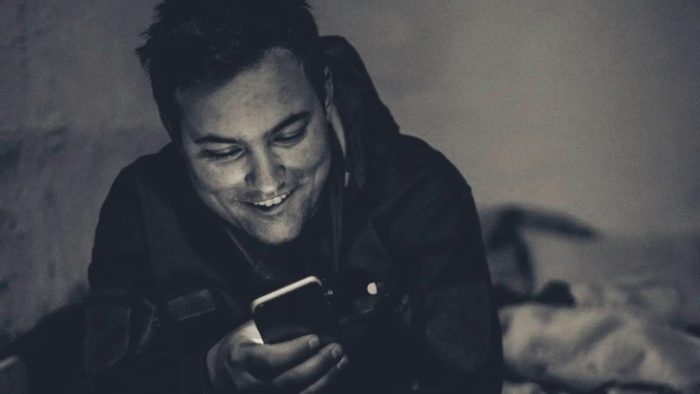On 24 February 2022, Russian troops invaded Ukraine from three directions, and immediately set out to capture several major cities in central and eastern Ukraine, namely Kyiv, Kharkiv, Sumy and Chernihiv. Thus, as of the first hours of the Russian invasion of Ukraine, Chernihiv came under fierce air attacks and shelling, and civilians were forced to flee or hide in bomb shelters. Bridges were destroyed, civilian and administrative infrastructure were seriously damaged; until recently, the city of Chernihiv was under total blockade.
During the siege, Chernihiv residents faced 24-hour shelling, food and water shortages, no communication and little hope of evacuation. Like besieged Mariupol, Chernihiv is still threatened with partial or total extinction if military and humanitarian aid is not provided as quickly as possible.
Moreover, there is an important historical and cultural element to this ancient city. First mentioned in 907, Chernihiv is the center of the historical region of Siveria or Sivershchyna, one of the most important settlements of Kyivan Rus (882-1240).
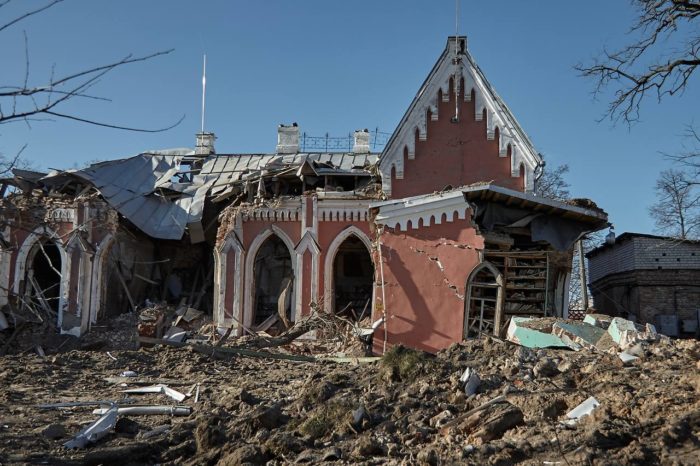
This magnificent city is well known for its monuments and exquisite architecture. It is also home to an impressive cluster of religious buildings and historical sites.
On 10 March, 2022, Mayor Vladyslav Atroshenko announced that the city had been completely encircled by Russian forces.
Some two weeks later, on 28 March, the Russian army repeatedly shelled residential areas in the northern part of the city, targeting high-rise building and recreation complexes. There was significant damage to civilian buildings and infrastructure. Russian soldiers did not hesitate to desecrate and demolish the tombs of Ukrainian soldiers who perished in the Donbas. They continued their destructive campaign, mining and/or bombing vital bridges at Konotop, Stara Rudnya, Smyach, Maly Dyrchyn and Velyky Dyrchyn. Later, as Russian military incursions withdrew from the town of Snovsk, they destroyed the bridge over Snov River.
While fighting continued in different regions of Chernihiv Oblast, residents of Chernihiv lived from day to day, constantly under the threat of air and missile attacks.
Olena managed to escape with her mother
Olena was able to leave the city on 5 March. She says that nobody in Chernihiv believed the Russian would actually attack.
As the Russians were not able to capture the city as planned, they began terrorizing the population with missiles, air attacks and constant shelling.
“At home I slept fully dressed, only three to four hours. Later we moved to the basement, because it wasn’t safe to stay in the apartment. At home, my whole body shook with fear even in those rare moments of peace and quiet. Only in the shelter did my knees and hands stop shaking. At least we didn’t hear the shelling anymore and could get some sleep.”
From time to time, Olena and her family returned home in order to shower and change clothes; they also picked up what they needed at the market and pharmacy.
“It was very difficult at home, in the apartment. Russian fighter jets flew very low over residential areas, deliberately terrorizing the population. We would lie silently in the corridor with pillows over our heads. We heard explosions and wondered whether we’d be next. We lay there for hours, silently praying that nothing would hit us.
This feeling of helplessness is so stressful, so depressing. The soldiers are busy fighting, while civilians are hostages, just praying and hoping to survive.”
With the help of volunteers, Olena and her mother were able to escape to a safer region of Ukraine. However, the hum of Russian planes and the noise of constant shelling linger in their heads. It is there to stay… Some of their relatives refused to leave the city. Her brother and grandmother fell ill and were not able to leave. Olena’s grandmother refused to abandon her family home, adamantly stating that she had survived World War II and would definitely survive this one, too!
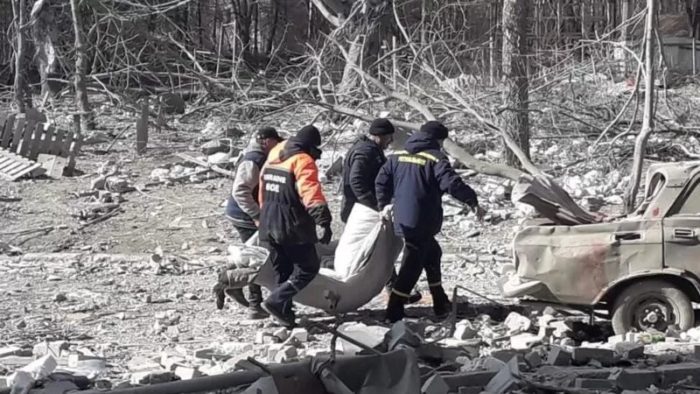
Dmytro and his friends delivered food and medicine
When war broke out, Dmytro moved his family to safety and founded a volunteer movement with his colleagues and friends. Together, they scoured the neighbourhood for various necessities, delivering food and medicine to the elderly and to families with children.
“It was getting more and more dangerous in and around the city. Frequent shelling, bombings, air strikes….
The Russian have destroyed half of the city - sports facilities, libraries, schools, historical monuments, civilian buildings. It’s horrible!
About 100,000 civilians remained in the city (285,000 in peacetime). Mostly pensioners. You could see them on the streets. Some people got psychologically used to the sirens and explosions… so they would walk their pets, read their newspapers or books on public benches, even when they heard bombs flying overhead. Others never ventured out of their shelters. Hundreds now have mental health issues. Unfortunately, we aren't equipped to help them. And, of course, there are so many sick people, many bedridden.”
Dmytro points out that what happened in Chernihiv should be called a humanitarian catastrophe - there was no light, no heating, and very little water, so people collected rainwater or fetched fresh water from the river. There were also big problems with food, transport and communication as the city was under siege and the Russians either targeted the humanitarian convoys or refused to let them through.
Dmytro says the situation worsened from day to day. People begged for bread and water, never mind milk or eggs. There were several cases of individuals literally dying of hunger. Locals also asked the volunteers to go and check on relatives and close friends in other parts of the city… to see if they were still alive.
“People even asked us to help them dig graves. The cemetery was open, and we could bury our residents in a dignified manner. It’s difficult to estimate the number of civilian casualties. Many residents are still under the rubble.
On a positive note… Despite the difficult conditions, our doctors continued working hard; they tended the wounded, conducted complex surgeries.
Many people wanted to leave. But how? All bridges had been blown up; the city was under complete blockade.”

Oleksandr remained in his bomb shelter and refused to leave his city
Oleksandr admits that total panic gripped the city in the first few days of the war. There were countless queues for food, household products, basic necessities, such as flashlights, telephones and power banks.
As the air strikes and shelling continued falling, locals got more and more used to living in bomb shelters. However, there was an overall feeling of helplessness and frustration. Every morning, they would emerge from their basements and see more ruins, more destruction, more desolation.
Then, when the Russians destroyed the main road bridge out of the city, Oleksandr realized that there was no more way out.
“All the other exit roads were surrounded by the northern horde, so we were trapped. Humanitarian aid couldn’t get through there was a shortage of food products in the stores.
Thank goodness we had all those preserved vegetables from last summer in our garage and basement. Food preservation, like pickling, drying and salting were once essential to help Ukrainians endure the long winters. Now, these traditions helped us endure the siege!”
As the panic subsided, residents adapted to a certain routine and started helping each other out. Due to his disability, Oleksandr was not able to join the army, so he decided to assist people in need by providing basic necessities.
“It’s important to stay busy and focused, keep your mind off the pain, suffering and noise around you. Otherwise, you collapse emotionally.
War is frightening. Yes, this phrase may ring hollow, but unless you’ve experienced war, you’ll never know the true meaning of fear!”
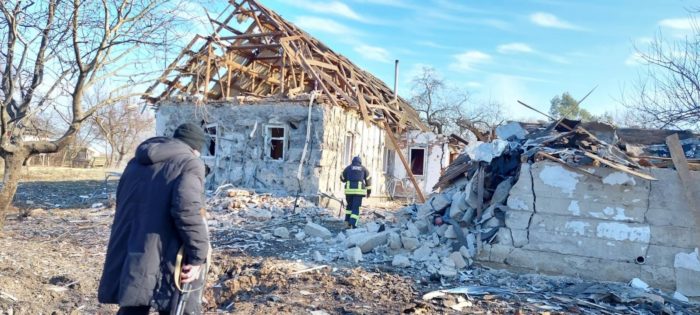
Volunteers under fire
Moscow has repeatedly declared that it would establish humanitarian corridors out of war zones. Unfortunately, the Kremlin has seldom respected its promises, and humanitarian convoys have regularly come under fire. Consequently, Ukrainian officials accuse Russia of disrupting humanitarian corridors and firing on civilians and volunteers.
On 31 March, the Russian invaders fired on humanitarian convoys heading toward Chernihiv.
Anastasiya Tahirova, a second-year student at the Faculty of Special and Inclusive Education of the Drahomanov National Pedagogical University in Kyiv, died in her vehicle.
26-year-old Oleksiy Antonov from Kyiv and Bohdan Stefanyshyn, husband of Ukrainian MP Olha Stefanyshyn were also killed.
Latest developments in and around Chernihiv
On 31 March, the Ukrainian Army recaptured the M01 highway connecting Kyiv and Chernihiv, ending the siege. The Mayor reported the first quiet night since the war began.
As of 1 April, Ukraine reportedly liberated Rudnya, Shevchenkove, Bobryk, Stara Basan, Nova Basan, Makeyevka, Pohreby, Bazhanivka, Volodymyrivka, Shnyakivka, Salne, Sofiyivka and Havrylivka.
On 2 April, the Ukrainian Army reportedly recaptured the village of Shestovytsia, having earlier retaken the village of Sloboda.
According to Operational Command Pivnich, as of 2 April, Russian occupation forces began leaving some settlements in Chernihiv Oblast, but the situation remains volatile. The Ukrainian military liberated the villages of Horodnia and Mykhailo-Kotsyubynske and destroyed 30 units of enemy hardware.
On 3 April, the Ukrainian Army recaptured the villages of Kolychivka, Yahidne and Ivanivka.
In his statement, head of the Regional Military Administration Vyacheslav Chaus reported that the Russian soldiers had held more than 150 locals in the school basement of the village of Yahidne. In fact, they did not allow the hostages to remove or bury their dead, so the villagers were forced to co-exist and sleep alongside the bodies.
“Many people got sick; others died. Here, the living co-existed next to the dead.
Hunger. Thirst. Fear. Pain. Despair. Toilets in a corner bucket. No fresh air. Crying children. There were many women and little kids. I salute their courage and endurance. There are no words to describe this tragedy. The enemy will answer for these crimes. Definitely!” Chaus said.
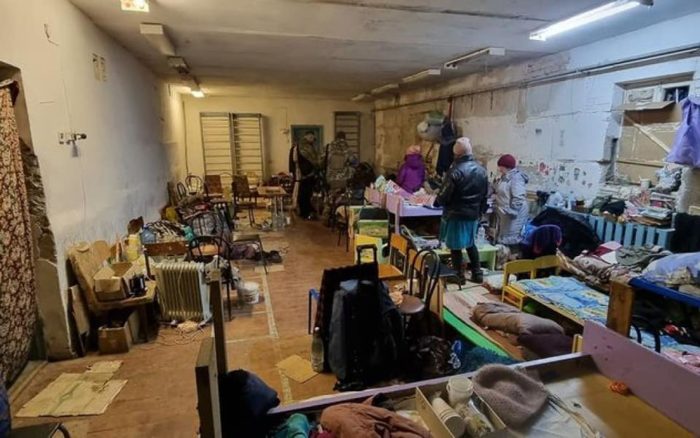
In conclusion, Chaus notes that during their retreat the Russians mined all the roads and destroyed most communication channels, so city officials request that residents remain in their homes until military engineers and sappers clear the region.
The Administration is currently organizing humanitarian aid and medical assistance to Chernihiv residents.
Related
- Russian military targets civilians fleeing bombardments
- As Russia continues bombing civilian structures Kyiv residents take shelter in city's vast metro network
- Every day of delay costs enormous amount of lives, says Ukrainian official
- Russian soldiers admit heavy losses, looting, shelling civilians in phone calls to wives and mothers
- Horror and terror in Mariupol eyewitness testimony of the bombing of Mariupol drama theater





